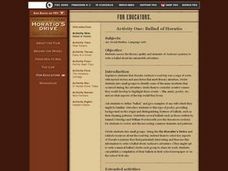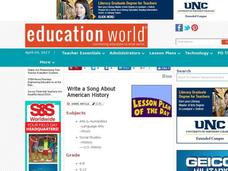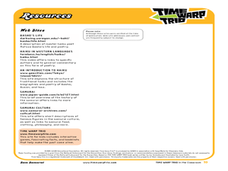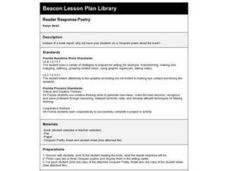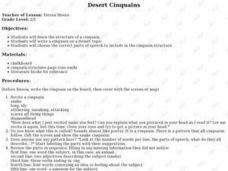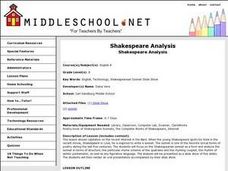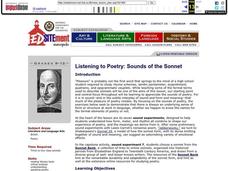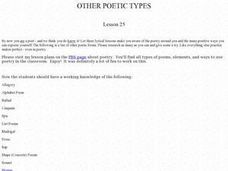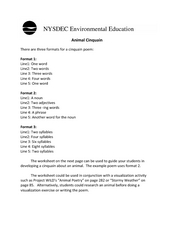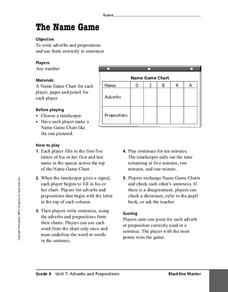Curated OER
Thanksgiving Acrostic Poems
Students watch streaming video, Holiday Facts and Fun: Thanksgiving, define and discuss acrostic poetry, complete circle map using words associated with Thanksgiving, and create acrostic Thanksgiving poems to be typed in Microsoft Word...
Curated OER
Poetry Prodigies
Students in three classes in different locations become Poetry Prodigies as they use iChat AV and an iSight camera to teach and explore from each other about different poetic styles. They explore six types of poetry are taught:...
Curated OER
Learning Empathy Through Art
Students create poems based on the Haiku form and research about WWII. Class discussion and classroom readings of student work finish this lesson. Emphasis is placed on Standards in the Arts.
Curated OER
The Texas Cowboy: Myth and Reality
Students create "cowboy ballads" in this interactive, multi-day lesson. The cowboy is researched using various sources and class discussions. Students evaluate individual work at the end of the lesson.
University of New Mexico
ESL - Thematic Unit Plan
Students read a variety of poetry books together in small groups. They examine Haiku poetry and share their favorites. They write their own Haiku either individually in a pair. They read and discuss limericks and work on writing their own.
Curated OER
Horatio's Drive
Students assess the literary quality and elements of Jackson's journey to write a ballad about his automobile adventure.
Curated OER
Write a Song About American History
Young scholars explore the historic background of the song, The Battle of New Orleans. Working in pairs, students research other historic events and write their own songs based on them.
Curated OER
Sam Samurai
Students study the history and culture of 17th century Japan by examining samurai. They review the format of haiku poetry and examine renga poetry. They examine Kamishibai, the Japanese storytelling form and apply it five facts they...
Curated OER
Haiku
Fourth graders create a haiku. They use a digial camera and file management techniques to save work. They also use a photo editor to manipulate the pictures. Finally, they create a PowerPoint presentation of their Haiku.
Curated OER
Show Don't Tell
Students review the Show Don't Tell method of writing haiku poetry. They practice distinguishing poetic language from academic language and create poems based on images, not explanations.
Curated OER
"Here's much to do with hate, but more with love": The Prologue in Romeo and Juliet
Young scholars participate in a guide close reading of the Prologue to Romeo and Juliet. They write a prologue sonnet to another piece of literature they have read.
Curated OER
Do You Haiku? We Do!
Third graders try their hands at writing Haiku, a form of Japanese poetry. Haiku is usually 17 syllables in three-line form. This engaging lesson has many excellent worksheets and website imbedded in the plan. They share their finished...
Curated OER
Desert Cinquains
Students use the cinquain structure and correct parts of speech to write a poem with a desert theme.
Curated OER
A Journey To Japan Through Poetry
Third graders gain an appreciation for writing, analyzing, reading and listening to poetry, viewing poems as a motivation for studying Japanese culture and tradition. They study and create their own haiku and tanka poems with illustrations.
Curated OER
Shakespeare Analysis
Eighth graders focus on the Shakespearian sonnet as a form and analyze the sonnet in terms of structure, the particular rhyme scheme of the quatrains and the rhyming couplet, the rhythm of iambic pentameter, as well as any figurative...
Curated OER
Listening to Poetry: Sounds of the Sonnet
Students experience and enjoy the sounds of poetry. They erform sound experiments with sonnets and closely read and analyze a sonnet by Shakespeare. Students write an analysis of how sound affects meaning in a sonnet chosen from the...
Curated OER
Edward Lear, Limericks, and Nonsense: There Once Was...
Students recognize poetic devices including rhyme, syllabification, and meter. They identify the characteristics of a nonsense poem and of a limerick. They write their own limericks.
Curated OER
Other Poetic Types
Rather than a lesson plan, this resource is a list of poetic forms and young poets are encouraged to try their hand at composing poems of various types.
Curated OER
Do You Haiku?
After examining several Haiku and noting characteristics of the form, class members create five of their own poems. Use this resource for extra practice or review.
Curated OER
Poetry as a Fine Art
Sixth graders use a visit to the National Gallery of Art to inspire descriptive writing. They choose works of art and write descriptive word lists, paragraphs and Haiku.
Curated OER
Animal Cinquain
In this poem-writing worksheet, 5th graders read the format for a cinquain poem and answer 5 questions about an animal of their choice. The questions guide students to write their own cinquain poem.
Curated OER
The English Sonnet: Michael Drayton
Students discover literature by conducting a free writing experiment. In this sonnet instructional activity, students read the sonnet "The Parting" and compare it to modern-day songs about breaking up. Students listen to pop music...
Curated OER
The Name Game
In this grammar worksheet, students write acrostic poems using the first 5 letters of their first and last names and provide adverbs and propositions for each letter. Then they write sentences for each word.







